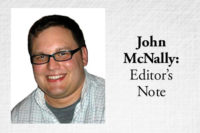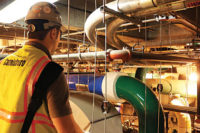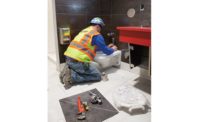Water treatment solution solves scale problems at Key West luxury hotel.
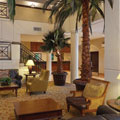
In the 1930s and 1940s, Ernest Hemingway’s home away from home was a favorite, old-world hotel located in the heart of Key West, Fla. Tennessee Williams lounged in the lobby. Al Capone and Harry Truman enjoyed their stays at the tropical paradise as well.
Today, Crowne Plaza La Concha’s seven-story, 160-room structure is still known for its iconic character and charm. The hotel is a stone’s throw from where gulls and belted kingfishers hop along sandy beaches. After a morning swim or shopping trip, guests from La Concha can return to their rooms for a nap or to relax under shady palms.
Yet, as the song suggests there can be trouble in paradise. The most essential natural resource for enjoyment of Crowne Plaza La Concha’s finest amenities is water - clean, pure water needed for hydration, mixed drinks, luxurious rainfall shower fixtures, bathing and laundry. Otherwise, Key West can be a salty, sweaty purgatory.
But the hotel’s water supply has presented a major challenge in recent times, measuring more than 180 mg/L of minerals - almost off the charts for measurable hardness.
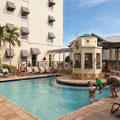
Help needed ASAP
Keeping the water freely flowing and without complication is a priority for the Crowne Plaza La Concha, which is why hotel managers decided to consider template-assisted crystallization - a new and innovative technology - in addressing its hard water scale problem.
Key West does not have a reliable water supply of its own. Historically, residents of the island relied on rainwater for sustenance. By the 1920s tourists had discovered the island’s beauty and demand quickly outstripped supply. In the 1940s, the U.S. Navy built a water pipeline along the Overseas Highway that runs the length of the Keys. Today, Key West receives the bulk of its water from that pipeline, which carries groundwater from the Biscayne Aquifer in the Florida Everglades.
The Biscayne Aquifer gets moist seepage through a vast, protected pine and rock area heavily loaded with minerals such as calcium and magnesium. In fact, according to the Florida Keys Aqueduct Authority, even after treatment the Keys’ water still is notoriously hard and is filled with minerals that can wreak havoc with fixtures and sensitive water heating equipment.
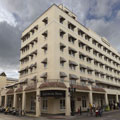
Crowne Plaza La Concha was not immune to these water woes. When it was built in 1926, the hotel did not have an issue with its water quality. But as the decades passed and harder water began to arrive by pipeline, the hotel began to experience serious scale buildup. The hotel’s equipment required increasingly more attention.
“You could visibly see the scale,” Chief Engineer Daniel Betlewicz says. “You could see it on the sinks, but especially in the back of the facility and in the laundry area where water was used on a daily basis.”
The bulky retrofit water-softening system that was installed in the already crowded maintenance room was problematic.
“We had an old-style softener,” Betlewicz says. “There was a huge tank right in the middle of the boiler room that had salt in it.”
The water softener certainly reduced minerals in the water, he explains, but it wasn’t enough. Time-consuming, unplanned maintenance was causing downtime that could affect guest comfort.
Regular maintenance on capital equipment, such as water heaters, was required. Upon opening the water heaters, La Concha engineers would find clumps of scale buildup that needed to be scraped out. “We had to clean a lot of stuff,” Betlewicz says, “[because] eventually it could completely plug things up.”
In spring 2007, Crowne Plaza La Concha managers decided to make a change. “The goal was to reduce the scale problem and save money on the maintenance,” Betlewicz says.
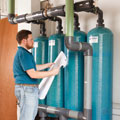
Tipping the scales
The template-assisted crystallization technology the hotel found to meet that goal was Watts’ OneFlow system, which pre-emptively attracts hardness minerals and converts them into harmless particles that will not stick to pipes and components. Hardness ions and counter-ions (bicarbonates) that would normally attach to fixtures instead combine to form inert nanometer-size “seed crystals.” The seed crystals keep the hardness minerals occupied, preventing them from attaching to fixtures and pipes, and instead causing them to float freely and harmlessly through the system.
TAC was the perfect solution for La Concha’s needs, says Next Filtration President Steve Fox, who helped La Concha choose the OneFlow system.
“They needed to replace a water softening system that just wasn’t able to do the heavy lifting,” he adds. “TAC is a proven technology that is perfect for hospitality where green solutions are very desirable and there is the need to see instant results and return on investment. Once we explained the benefits of OneFlow, the hotel was sold.”
Those benefits include scale prevention, virtually no maintenance, zero water discharge or waste and no required electricity. Another significant benefit of the system is the reduced cost, not only in eliminating the need for storing and using large quantities of salt, but also in the maintenance and increased life of capital equipment.
Betlewicz describes the hotel’s decision as a perfect fit. The small footprint of the units, he says, was one of the final reasons that convinced the hotel to give the system a try. “This system actually fits in my boiler room,” he says. “We’ve got limited space because the building is old. It wasn’t built with that many storage spaces, like the new builds, these days. This system is very compact with just four tubes.” The space used in the maintenance area, he says, was ultimately reduced by 90%.
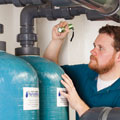
Positive results
The system was introduced on a 90-day trial run. “Hotel managers were impressed all the way around,” Fox says. “The degradation from scaling and salt corrosion was eliminated and the customer has even noted that some of its existing scale has dissolved away. The system saved them money right out of the gate. They also are excited about the ability to be greener - “a good neighbor” is how they put it - with less water waste and no salt introduced back into the water supply.”
Gone are the days when emergency night service calls, plugged-up equipment and calcified commercial water heaters were legitimate concerns.
“Those problems are things of the past,” Betlewicz says. “The other key advantage is saving money. I don’t have to schedule the guys to take apart the equipment. We just do light, routine maintenance. Our costs have been reduced dramatically. No one calls about scale problems anymore. This is a good solution for any hotel.”
There was a minor service call in recent times that produced even more positive results. “A couple months ago, we had to replace the motor on one of our domestic pumps and when the contractors took the system apart, it showed no sign of scale inside,” Betlewicz says. “Even the contractors were surprised. We have no problems with the water heaters, sinks, showerheads or laundry equipment. I wish we’d have done this sooner.”

Tackling a new challenge
Engineer sees similar water challenges in native Poland.
Crowne Plaza La Concha Chief Engineer Daniel Betlewicz recently returned to his native Poland to continue work on a home-building project.
“The house is almost done and in this phase it requires my personal attention,” says Betlewicz, a native of Strzelin, Poland. “I started the project a couple years ago. When the (economic) crisis hit all over the world, I did not want my money to sit in a savings account, so I decided to invest in something and I chose to build a house in Poland. The cost of materials and labor went down. It seemed like a good idea at the time and now it’s still looking good - I think. It was hard to manage it from the other side of the world, but with a little help from my father-in-law I’ve achieved my goals.”
Betlewicz says the secondary housing market in Poland is growing but is nowhere close to U.S. levels. “It might sound weird to people who live in the United States to build a house as a private person, but in Poland it’s still popular to build a new house instead of buying a used one.”
Betlewicz is building a 2,100-sq.-ft. house with a pair of one-car garages (one is contained on a free-standing addition). The home sits on 0.4 acres of land in a new suburban family housing development.
Like at La Concha, Betlewicz is encountering water quality problems during construction. “In some new development areas, cities did not have a water supply or sewer infrastructure in place before homeowners moved in, so they drilled wells,” he explains. “The water needs to be filtered because it is not drinkable straight from the well. Right now, I’m on the filtration system to make the water usable.”
Betlewicz and Watts have spoken about the possibility of establishing a link to where he could specify and oversee installation of technology such as the OneFlow system for commercial water filtration uses in Poland.
Betlewicz, who worked in the vending machine business in Poland before coming to the United States, sees many changes occurring in Poland on the construction front. “There is a lot of ongoing construction,” he says. “New roads and new buildings are being built and there are many old infrastructure restoration projects.”
In comparing plumbing engineering in the United States and Poland, Betlewicz doesn’t notice major differences in the physical parts of systems, but rather in the way codes are enforced.
“In Poland you have to obey country codes and as a member of the European Union you have to follow their rules as well,” he says.
A sustainability push is well under way. “There is more and more recycling and more clean-energy projects such as bio-fuel or wind-powered generator plants,” Betlewicz says. “There is a lot of pressure in Poland to go green.”
